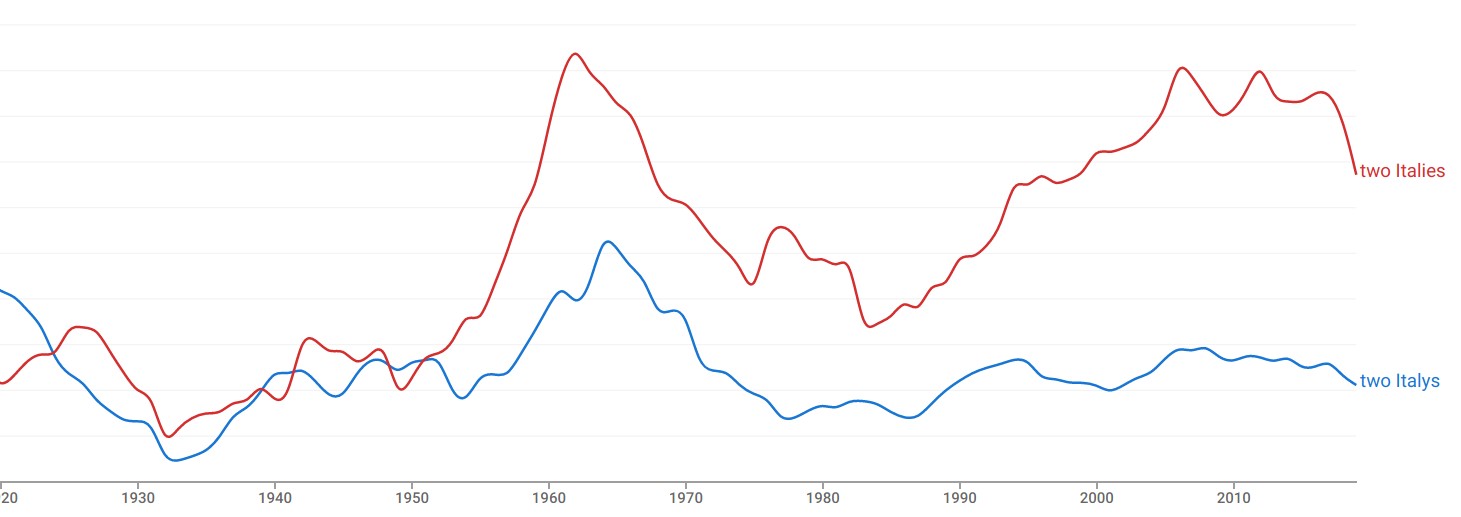Can't we always form a plural for a place/country that isn't already a plural, like The Bahamas or the Netherlands? Suppose I want to say There are really two Xs: the one the tourists see and the one I will tell you about.
Note that two plural spellings appear to be in use for some countries ending in y.
I have sometimes been tempted to think that, as the mythologists make
mention of three Jupiters, so there must be at least two Englands.
In her past history, I have observed indications of a compound nature
as diverse as her twofold language; and in recent times they seem to
contend for mastery. It is with one only that I have to do at present.
Aubrey De Vere; English Misrule and Irish Misdeeds (1848)
Cold and sea will train an imperial Saxon race, which nature cannot
bear to lose, and after cooping it up for a thousand years in yonder
England, gives a hundred Englands, a hundred Mexicos. All the bloods it shall absorb and domineer: and more than Mexicos, the secrets of water and steam, the spasms of electricity, the ductility of metals, the chariot of the air, the ruddered balloon are awaiting you. Ralph Waldo
Emerson; Conduct for Life (1860)
"There are two Frances, and theirs is the bad one"—Bishop of Amiens,
1895
Robert Tombs; France 1814-1914
There have always, he argues, been two Frances, one turning its face
to the sea, dreaming of free trade and distant adventures, and the
other, the France of the land, stuck-in-the-mud and embedded in
inflexible constrains. F. Braudel; Civilization and Capitalism,
15th-18th Century, Vol. III
A century ago, the red and the black referred to the struggle between
two Frances, one anticlerical, socialist, universalist; the other Catholic, conservative, nationalist. B. E. Brown; Protest in
Paris
In Portugal this same fundamental split between liberals and
conservatives was present, even though its expressions were not quite
so bloody.
From the eighteenth century onward, therefore, two
Spains and two Portugals grew up. Howard J. Wiarda; Iberia
and Latina America
Mary Fulbrook; Interpretations of the Two Germanies, 1945-1990
(2000)
Roy E. H. Mellor The Two Germanies: A Modern Geography (1978)
Christopher Hilton; After the Berlin Wall: Putting Two
Germanys Back Together Again (2009)
Frank E. Manual; The Two Spains (1956)
McKinsey Global Institute and E. Bolio; A Tale of Two Mexicos
(2014)
Joseph Luzzi; My Two Italies (2014)
H. L. Mathews; A Tale of Two Italys (2019)
M. Dunford and L. Greco; After the Three Italies: Wealth,
Inequality and Industrial Change (2011)
An illustration of this front dynamic with Dutch populism is the 'Two
Netherlands' speech of Geert Wilders at the Budget Review of 2009:
"The realm of Blakenende is a kingdom of two Netherlands...On the one
hand our elite, with their so-called ideals. Of a multicultrual
society, the mega-high taxes, the lunatic climate hysteria...The other
Netherlands consists of the people that have to pay the bill,
literally and figuratively."
R. Wodak et al.; Right-Wing Populism in Europe
We do the same for other names. I know two Charleys and two Charlies. Mr. and Mrs. Brown (and their children) are the Browns even though that's not their last name. We say neither *two Italy nor *all the Brown.

